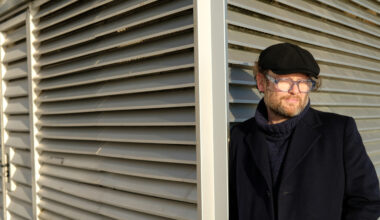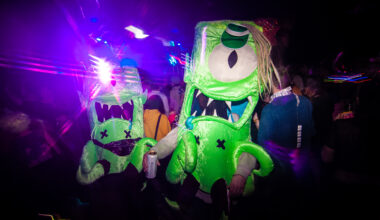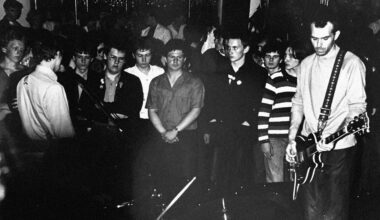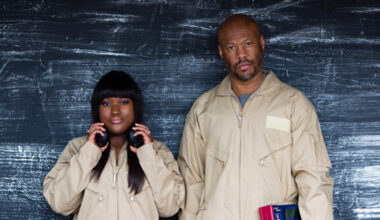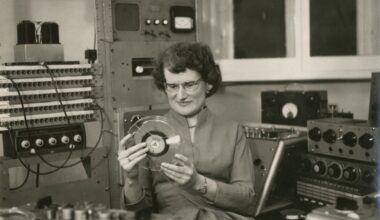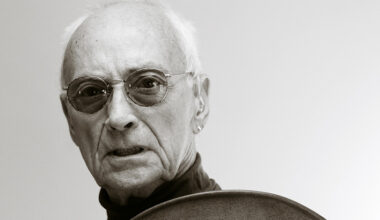Under the shadow of Jodrell Bank’s gigantic Lovell telescope, Bluedot returns for a scintillating weekend of live music, science and culture
Midnight at Bluedot 2022, and the towering parabolic dish of the Lovell telescope blazes with psychedelic sci-fi imagery visible from 30 miles away, lighting up the Cheshire Plain. There are few places more enchanting than Jodrell Bank in July, especially now that Britain’s most magical music-meets-science festival is back in action after a long pandemic sabbatical. Named after legendary TV astronomer Carl Sagan’s oft-quoted observation about Earth as seen from deep space, Bluedot has the strange power of making you feel cosmically insignificant and supernova huge at the same time. It may not be rocket science, but it comes pretty close. And the stars look very different tonight.
Eclectic and electric, Bluedot offers a rich mixtape of treats for brain and senses alike. Alongside a broad musical menu from Metronomy to Mogwai, Squarepusher to Kojey Radical, this year’s programme also features astrophysicists, actors and astronauts. What other event could book Tim Peake and Maxine Peake, and draw huge crowds with both?
By happy serendipity, this year’s boundary-pushing bill is book-ended by world-class female avant-pop icons, each commanding huge orchestras. Long postponed by global events, Björk’s ‘Orkestral’ show with Manchester’s Hallé Orchestra is set to close the weekend. But festivities open in grand style on Thursday with Hannah Peel and Paraorchestra, the world’s only large-scale ensemble of professional disabled and non-disabled musicians.
Led by conductor Charles Hazlewood, this massed collective plays tracks from their recent collaborative album, ‘The Unfolding’, plus some exquisite extras including Peel’s twinkly music-box interpretations of New Order’s ‘Blue Monday’ and Soft Cell’s ‘Tainted Love’. It’s adventurous, poignant, uplifting and very Bluedot. A spine-tingling start to an otherwordly midsummer night’s dream of a festival.
Besides its musical component, Bluedot is essentially hauntology central, a living museum of mid-century modernism, a feast of ‘Tomorrow’s World’ nostalgia for the lost techno-utopian future that post-war Britain promised but never quite delivered. Completed in 1957, the Lovell telescope itself is a product of this progressive era, with its mass social housing, bold engineering projects, public information films, space-age design aesthetic, Oliver Postgate’s hand-knitted animated characters and Radiophonic arts lab soundscapes. A time when Labour prime ministers proudly boasted about the white heat of technological revolution.
The pop culture aftershocks of this fertile period, from screenings of ‘The Clangers’ to lectures on Cold War technology, are woven into the festival’s fabric. Indeed, a live talk about Delia Derbyshire Day – featuring Hannah Peel, current Radiophonic Workshop musical director Mark Ayres and soundtrack composer Nainita Desai – is just one of the various nerdgasm events designed to lure in Bluedot’s hardcore contingent of analogue synth-geeks and Betamax retro-futurists.
Naturally, Electronic Sound is in the front row to witness Ayres play a rare Delia track, the deliciously bleepy ‘Dance From Noah’, which was once used to demonstrate Peter Zinovieff’s fabled EMS synthesiser range.
“It sounds like it could be released on Warp today,” says Ayres, approvingly.
If any contemporary act in this year’s Bluedot line-up embodies this antique modernist aesthetic to a tee, it is Public Service Broadcasting, an inspired last-minute addition to the line-up after Covid forced Spiritualized to pull out. Having paid impressionistic tribute to Berlin on their most recent album, ‘Bright Magic’, which draws on everything from Kraftwerk to Bowie to Blixa Bargeld, J Willgoose, Esq and his white-suited lab assistants seem more comfortable with their conceptual approach nowadays – more streamlined and funky, less mannered and apologetically zany.
PSB’s audiovisual hymns to post-war collectivism, the space race and the South Wales mining industry are suffused with hauntological yearning, while newer tracks like ‘Blue Heaven’ and the vocoder-powered ‘People, Let’s Dance’ update the band’s sepia-toned Airfix-kit-nostalgia with a sexy Day-Glo 1980s europop makeover. Lovely stuff.
It may be an international festival with an intergalactic outlook, but Bluedot also has an emphatically northern English accent, drawing on the enduring post-punk and electronic legacies of nearby Manchester, Sheffield, Leeds and Liverpool.

This year’s line-up is once again rich in local talent, from Lancashire acid-kraut/psych-rocker Jane Weaver to Liverpudlian art-pop quartet Stealing Sheep and Cheshire’s very own indie mop-top crooner Tim Burgess, alongside a stellar constellation of veteran Mancunian candidates like A Guy Called Gerald. Even the weather remains resolutely northern all weekend, with lashing rain between bursts of sullen sunshine.
Once again, the spirit of Factory Records hangs heavy in the air here, not least on the countless T-shirts celebrating Joy Division and (former festival headliners) New Order. But also in the living, breathing examples of former Haçienda regulars like A Certain Ratio, whose sinewy disco-punk jazz-funk still sounds amazingly lean, lithe and box-fresh.
With frontman Jez Kerr absent due to injury, youthful new recruit Ellen Beth Abdi takes over the main vocal duties, while multi-instrumentalist dynamo Donald Johnson pays touching tribute to “our friend” Paul Ryder, the Happy Mondays bass guitarist who died suddenly just days before. They may be the oldest swingers in town, but ACR are still smoking on the go-go scene.
Another Bluedot act drawing self-consciously but fruitfully on that timeless Factory aesthetic is LoneLady, aka Julie Campbell, whose tension-filled synth-funk set buries awkward passions and warm heartbeats beneath cool, dry, sharp-angled Mancunian attitude. “Cloudy skies. Just how I like it,” she quips. Classic northern soul.
This year’s Bluedot is also buzzing with a newer, younger cohort of spiky northern talents. On the back of their new album, ‘Fear Fear’ – made, they say, for “agitating and dancing” – Todmorden’s Working Men’s Club play a blinding set. Tight-lipped frontman Syd Minksy-Sargeant tugs at his shirt as he menacingly prowls the brim of the stage, glaring and intense, daring the audience not to surrender to his pulsing, declamatory, synth-rock sermons.
By contrast, fellow Yorkshire band Yard Act spice their Mercury Prize-nominated junk shop punk-pop with verbose comedic rants and weapons-grade sarcasm as frontman James Smith prods at the eternal open wounds of class, wealth inequality and gentrification. And a rammed set by Manchester’s own W H Lung, winningly named after a Chinese supermarket, offers an electrifying masterclass in fuzzed-up shoegazing krautronica.
In their own different ways, all these bands are adding to the legacy of local legends like New Order, Cabaret Voltaire, Pulp and The Fall. But, crucially, the parallel is more in bullish self-belief than slavish recreation.
Citizens of Bluedot, are you ready for Squarepusher’s weapons of mass disruption? Is your brain fully braced for a sense-blitzing, synapse-snapping, face-melting assault on musical convention? Of course not. The whole point of Tom Jenkinson’s ferocious electro-jazz/synth-punk/turbo-glitch maximalism is to blast your mind wide open and blowtorch away all those tedious, restrictive and pointless notions of middlebrow good taste.
Huddled inside a sinister high-tech control booth like some futuristic supervillain, the wild-haired ace of bass triggers relentless volleys of gabba-speed EBM beats, circuit-bending noisecore and reality-rupturing drill ’n’ bass, all leavened by some incongruously mellow detours into melodious lounge jazz.

Meanwhile, the piercingly high-resolution video graphics behind him sizzle and implode with retina-scorching intensity. All that is solid melts into air. As usual with Jenkinson, the cumulative effect is both nausea and euphoria, like freebasing an entire century of avant-garde art in one hyper-intense trip. But there is method in his madness – a tight control and a sharp wit that leaves you more exhilarated than exhausted.
A palpable sense of anticipation hangs around Jockstrap, the young, London-based duo whose artfully wonky electropop combines glitchy synth squelches, mangled beats, violin flurries, disorientating samples, oblique nods to hip hop and incongruously fragrant waltz-time reveries.
Taylor Skye and Georgia Ellery (who also plays with Black Country, New Road) fizz with alluring mischief at their well-attended Bluedot set. They’re dissonant and abrasive one minute, swooningly romantic the next, often within a few bars of the same tempo-warping track. Ellery’s theatrical chanteuse poses and mirthful, surreal, saucy lyrics already feel primed for popstar fame. With a terrific debut album due in September, Jockstrap will soon be playing bigger stages than this, but they effortlessly charm the pants off Bluedot anyway. The only way is up.
The festival’s most mainstream headline act this year, Groove Armada, are currently midway through their 25th anniversary tour, which Andy Cato and Tom Findlay are billing as their Elton-style farewell to big live shows.
Their Friday night performance is an impressively slick son et lumière spectacle, complete with blazing lasers and multiple guest vocalists, albeit a little too heavy on facelessly functional dance-pop anthems. A teasingly brief version of their signature chill-out classic ‘At The River’, with its slow-motion brass swoons and dreamy Patti Page vocal sample, sounds majestic in its exploded live arrangement, a trippy deconstruction very much in the spirit of Primal Scream’s ‘Screamadelica’.
In fairness, Groove Armada make an admirable effort in beaming their bespoke video projections onto the Lovell telescope dish, a Bluedot tradition that the GA team fully exploits with busy montages of whirling skulls, shapeshifting band logos and pop art graphics.
The same is true of Saturday headliners Mogwai, who play beneath a humongous circular screen ablaze with kaleidoscopic colour washes and super-sized action paintings. The veteran Glaswegian post-rockers can sometimes lean towards overly tasteful ambient territory, but they bring maximum cinematic melodrama to Bluedot, their brooding instrumental symphonies switching from hushed rumble to thunderous roar in a flashbulb instant.
Commendably, this year’s Bluedot has a bumper selection of left-field female electronic artists.
Strutting around the stage in disco dominatrix mode, London-based Nuha Ruby Ra is a blast, blending confrontational performance art with thumping techno-punk.
Fur-coated Berliner Sofia Kourtesis is a great discovery too, pumping out euro-rave anthems underpinned by warm, dubby basslines and impassioned lyrics. These tracks could almost be big-room techno belters but Kourtesis fills them with delightfully eccentric, off-kilter oddness.
Back in 2019, Electronic Sound witnessed a semi-unknown Kelly Lee Owens playing Bluedot. Even then, she seemed to be having the greatest party ever, at least inside her own head, twirling, bouncing and throwing high-energy pop-queen shapes. Three years and two magnificent albums later, the world has caught up with the witchy Welsh techno-hippie diva, who draws a tent-bursting crowd with her shimmering vocals and propulsive, precision-tooled electro bangers.
Playing beneath a screen exploding with dazzling constructivist graphics, Owens injects warm, funny, soulful, sensual charm into machine-made music. Having recently shared her love of gravy, Enya and the wisdom of older relatives with ES, it comes as no surprise to see a twinkly stardust portrait of her nan Jeanette sparkle onscreen during the track of the same name.
“Are you ready to dance with Jeanette?” she beams, fizzing with intent.
Kelly, we were born ready. This is a breathless, pulse-quickening, mood-lifting, gravy-powered performance from a mighty talent.
Can anyone play second billing to Björk without looking pale and amateurish by comparison? Step forward Anna Meredith and her band, whose vivid, richly melodic mash-ups of propulsive electronica with tuba, cello and clobbering percussion work like a treat on the big Bluedot stage.
As usual, Meredith radiates nervy, endearing, self-effacing charm, dropping deadpan quips between stampeding electro-orchestral anthems that seem to rocket skywards in gravity-defying, Escher-like spirals.
“I hope this wasn’t a stupid idea,” she frowns before signing off with an Elton John medley, maintaining her tradition of ending every show with a novelty cover version. Judging by the warm sing-along reaction it inspires, this goofy finale is indeed stupid – delightfully, hilariously stupid.

And so to Björk, who inevitably draws the biggest crowd of the weekend. Wrapped in a puffy, hooded plastic dress by fashion designer Pierpaolo Piccioli, she looks both preposterous and magnificent, like some hallucinatory hybrid creature from an LSD-fuelled body-horror remake of ‘Alice In Wonderland’. She is joined by Icelandic conductor Bjarni Frímann Bjarnason (in his chic man-skirt, natch), and the massed strings of Manchester’s fabled Hallé Orchestra.
It makes perfect sense that Björk should book the sole UK date of her ‘Orkestral’ tour at Bluedot, given her science-geek leanings and long history of Mancunian connections. Indeed, she laid the foundations for her post-Sugarcubes solo career here by working with 808 State, and later premiered her hi-tech ‘Biophilia’ world tour with a residency at the city’s Museum Of Science And Industry in 2011 – one of the most jaw-dropping live spectacles this reviewer has ever seen.
Featuring songs from her three-decade solo career reworked into voluptuous string arrangements, all credited to Björk herself, this prom-style performance initially feels remote and underpowered. With no video screens, and no accompanying projections on the Lovell telescope, the visual presentation is unusually tame for such an innovative live performer. But as the set builds, her classic songs blossom and glow. A sweeping ‘Isobel’, a cascading ‘Jóga’ and an achingly romantic ‘Hyperballad’ all sound luminously beautiful, with pizzicato strings replacing programmed beats and synthesised basslines.
Björk barely speaks between tracks, for reasons that only become clear during the encore, when she confesses she caught Covid just days before Bluedot and was unsure if her voice would even function. Happily, aside from a few hiccups and wobbles, those mighty geothermal tonsils sound as potent as ever, a diamond geyser of volcanic emotional force.
“Anyway, fuck Covid!” she concludes. In a winning final twist, she rounds off this easy-listening set with a throbbing orchestral remix of the techno-adjacent stomper ‘Pluto’ – “Because techno beats deserve it!”. Correct.
Not much can top a Björk performance, but Bluedot ends on a deliciously surreal coda. Sheffield’s Eccentronic Research Council – aka Adrian Flanagan and Dean Honer (The Moonlandingz, International Teachers of Pop) – are joined by their long-time pal Maxine Peake for a late-night show rooted in their ‘Dreamcatcher Tapes’ project, a mix of burbling lo-fi electronics and spoken-word monologues relating the dreams and nightmares of various friends, associates, musicians and eccentrics. It’s a boozy, woozy, funny, macabre and emphatically northern – what else? – conclusion to a gloriously unique midsummer festival.
As the Bluedot exodus begins, a vague air of melancholy hangs over Jodrell Bank. Parting is such sweet sorrow. But rest assured, we will gather under the stars again next year. Until then, we will always be together in electric dreams.
Tickets for Bluedot Festival are on sale at discoverthebluedot.com

